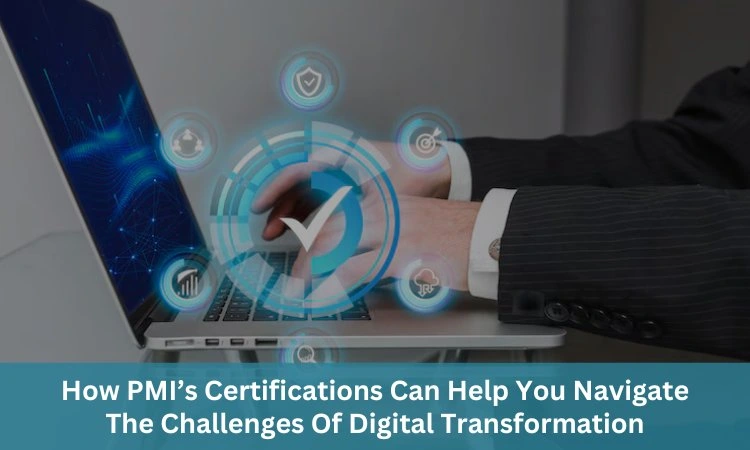Understanding The Digital Transformation Landscape
Utilizing digital technologies to radically alter how companies run and provide value to clients is known as digital transformation. This may include adopting cloud computing, implementing artificial intelligence, or integrating advanced data analytics into business processes. The rapid pace of technological change, coupled with evolving customer expectations, presents significant challenges for project managers.
The Role Of PMI Certifications In Digital Transformation
PMI’s certifications are renowned for their rigor and relevance, providing project managers with the tools and knowledge needed to excel in a digitally-driven environment. You can overcome the difficulties of digital transformation by using the following PMI certifications:
1. Adapting to Evolving Technologies With PMP Certification
In the field of project management, the Project Management Professional (PMP) certification is the gold standard. It covers a broad range of project management principles and practices, including those pertinent to digital transformation. With PMP, you’ll learn how to manage complex projects, lead cross-functional teams, and adapt to technological changes.
In the context of digital transformation, PMP equips you with the skills to:
- Manage Technological Integrations: Oversee the implementation of new technologies and ensure they align with project goals.
- Handle Change Management: Effectively manage changes and transitions, which are common during digital transformation.
- Ensure Stakeholder Engagement: Engage stakeholders and manage their expectations as digital initiatives unfold.
2.Strategic Alignment with PgMP Certification
The Program Management Professional (PgMP) certification is designed for those who manage multiple, related projects and align them with organizational strategy. As digital transformation often involves several interconnected initiatives, PgMP helps you ensure that all projects contribute to the overall strategic vision.
PgMP helps in:
- Aligning Projects with Strategic Goals: Ensure that digital initiatives are aligned with organizational objectives and drive strategic outcomes.
- Managing Dependencies: Oversee dependencies between digital projects to avoid conflicts and optimize resource utilization.
- Governance and Oversight: Implement governance frameworks to monitor program performance and ensure successful delivery of digital transformation goals.
3.Agility in Digital Projects with PMI-ACP Certification
The PMI Agile Certified Practitioner (PMI-ACP) certification focuses on agile methodologies, which are increasingly relevant in the context of digital transformation. Agile practices are essential for managing the iterative and incremental nature of digital projects.
PMI-ACP helps you:
- Implement Agile Frameworks: Apply agile frameworks such as Scrum, Kanban, and Lean to manage digital projects effectively.
- Foster Continuous Improvement: Embrace iterative development and continuous feedback to adapt to changing requirements and technologies.
- Enhance Collaboration: Promote collaboration among team members and stakeholders to accelerate digital project delivery.
4.Specializing with PMI-RMP and PMI-SP Certifications
The PMI Risk Management Professional (PMI-RMP) and PMI Scheduling Professional (PMI-SP) certifications are valuable for managing the specific challenges of digital transformation. PMI-RMP focuses on identifying and mitigating risks, while PMI-SP emphasizes effective scheduling and time management.
PMI-RMP helps you:
- Identify and Manage Risks: Proactively identify risks associated with digital technologies and implement mitigation strategies.
- Develop Risk Management Plans: Create comprehensive risk management plans to address uncertainties in digital projects.
PMI-SP helps you:
- Create Realistic Schedules: Develop accurate schedules for digital initiatives, considering dependencies and resource constraints.
- Manage Project Timelines: Ensure timely delivery of digital transformation projects and adjust schedules as needed.
Investing in PMI certifications not only enhances your project management capabilities but also positions you as a leader in driving successful digital transformation within your organization. As businesses continue to evolve in the digital age, PMI certifications offer a competitive edge and ensure you’re well-prepared to meet the challenges of tomorrow’s projects.

